|
|
|
Sort Order |
|
|
|
Items / Page
|
|
|
|
|
|
|
| Srl | Item |
| 1 |
ID:
099887
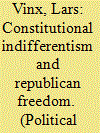

|
|
|
|
|
| Publication |
2010.
|
| Summary/Abstract |
Neo-republicans claim that Hobbes's constitutional indifferentism (the view that we have no profound reason to prefer one constitutional form over another) is driven exclusively by a reductive understanding of liberty as non-interference. This essay argues that constitutional indifferentism is grounded in an analysis of the institutional presuppositions of well-functioning government that does not depend on a conception of liberty as mere non-interference. Hence, indifferentism cannot be refuted simply by pointing out that non-domination is a distinctive ideal of freedom. This result does not suffice to defend the strong version of indifferentism put forward by Hobbes. But it does point to an important limitation of neo-republican constitutional theory: Neo-republicanism will amount to a distinctive paradigm of constitutional thought only if it is understood in a way that conflicts with Hobbes's understanding of the institutional presuppositions of well-functioning government. It is doubtful that we have good reason to embrace neo-republicanism, so understood.
|
|
|
|
|
|
|
|
|
|
|
|
|
|
|
|
| 2 |
ID:
167409
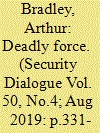

|
|
|
|
|
| Summary/Abstract |
This article proposes a political prehistory of drone theory that traces its juridico-political evolution from the 17th century to the present day. To outline my argument, I construct a constellation between Hobbes’s theory of sovereign punishment in Leviathan and Chamayou’s critique of drone warfare in Drone Theory to illuminate the political origins of drone violence. First, I argue that Hobbes’s social contract theory lays the conceptual groundwork for Chamayou’s drone theory. Second, I contend that Hobbes’s theory of the sovereign punishment of domestic citizens preempts Chamayou’s critique of drone warfare against foreign enemies. Finally, I speculate that Hobbes’s theory of punishment is founded upon a sacrificial paradigm that returns in the phenomenon of domestic drone strikes. In summary, I argue that Hobbes might be something close to the first drone theorist insofar as his political theory systematically produces the state of exception between citizen and enemy in which the drone operates today. What, then, are the theoretical origins of drone warfare? How does the punishment of citizens prefigure drone warfare against foreign enemies? To what extent might even citizens themselves be a species of drone who may be activated by the sovereign at any point?
|
|
|
|
|
|
|
|
|
|
|
|
|
|
|
|
| 3 |
ID:
085002
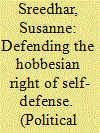

|
|
|
|
|
| Publication |
2008.
|
| Summary/Abstract |
A well-known part of Hobbes's political theory is his discussion of the inalienability of the right of self-defense. In this article, I present and defend a reinterpretation of Hobbes's account of self-defense. I begin by showing the weaknesses of the standard interpretation of this account: It rests on an implausible thesis about the evil of death; it renders Hobbes's applications of the right of self-defense inexplicable; and it conflicts with Hobbes's claim that there are cases in which the right of self-defense can be given up. I argue that we should understand Hobbes's claim to be that the right of self-defense is inalienable only in the social contract, and I offer a new interpretation of how his argument on this point might go.
|
|
|
|
|
|
|
|
|
|
|
|
|
|
|
|
| 4 |
ID:
085337
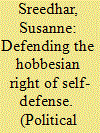

|
|
|
|
|
| Publication |
2008.
|
| Summary/Abstract |
A well-known part of Hobbes's political theory is his discussion of the inalienability of the right of self-defense. In this article, I present and defend a reinterpretation of Hobbes's account of self-defense. I begin by showing the weaknesses of the standard interpretation of this account: It rests on an implausible thesis about the evil of death; it renders Hobbes's applications of the right of self-defense inexplicable; and it conflicts with Hobbes's claim that there are cases in which the right of self-defense can be given up. I argue that we should understand Hobbes's claim to be that the right of self-defense is inalienable only in the social contract, and I offer a new interpretation of how his argument on this point might go.
|
|
|
|
|
|
|
|
|
|
|
|
|
|
|
|
| 5 |
ID:
085339
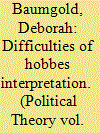

|
|
|
|
|
| Publication |
2008.
|
| Summary/Abstract |
Idiosyncrasies of Hobbes's composition process, together with a paucity of reliable autobiographical materials and the norms of seventeenth-century manuscript production, render interpretation of his political theory particularly difficult and contentious. These difficulties are surveyed here under three headings: (1) the process of "serial" composition (meaning the production of multiple, often expanded, versions of a work), which was common in the period; (2) the relationship between Hobbes's three political-theory texts- the Elements of Law, De Cive, and Leviathan, which is basic to defining the textual embodiment of his theory, and controversial; and (3) his method of writing. I argue that Hobbes's composition process undercut his intention to produce a deductive, logical theory of politics and opened the door to inconsistency and muddle in his arguments.
|
|
|
|
|
|
|
|
|
|
|
|
|
|
|
|
| 6 |
ID:
164976
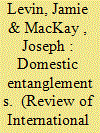

|
|
|
|
|
| Summary/Abstract |
This article revisits the Hobbesian account of the state of nature and the formation of states, attending to Hobbes’s account of the family. Drawing on feminist readings, we find in the Leviathan an account of the family as a natural political community. We contend specifically that a focus on conceptions of family life in the Leviathan, and in works by Hobbes’s early modern peers, points to the role of the family as a site of socialisation in the prelude to early state formation and in the formation of political hierarchies more generally – including, we suggest, the formation of international hierarchies. These accounts have thus far been missing from International Relations theory. Contra conventional IR theoretic readings of the Leviathan, the Hobbesian state of nature contains the seeds of both anarchy and hierarchy, as overlapping social configurations. While anarchy emerges clearly in the famous condition of ‘war of all against all’, hierarchy also exists in Hobbes’s depiction of family life as a naturally occurring proto-state setting. On the basis of this contemporary feminist analysis of a classic text, we consider implications for the emerging ‘new hierarchy studies’ in IR.
|
|
|
|
|
|
|
|
|
|
|
|
|
|
|
|
| 7 |
ID:
146241
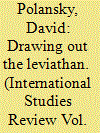

|
|
|
|
|
| Summary/Abstract |
Neo- or structural realism is famously said to lack a theory of the state. Resisting the urge to devise one, I would instead argue that structural realist theories—most notably the original theory of Kenneth Waltz—implicitly contain a theory of the state. What has eluded commentators is that this theory is prescriptive rather than descriptive. Insightful readers like Goddard and Nexon and Rathbun have unpacked Waltz’s (nondeterminative) prescriptions for state behavior in the international system. This article will unpack those prescriptions for state order. Two conclusions emerge from this analysis: (i) structural realism implicitly reads essential features of the modern state into what are otherwise proclaimed to be nonspecific like units in anarchy and (ii) the ideal-typical state prescribed by Waltz’s theory most resembles Hobbes’ Leviathan. Making these connections explicitly may indicate why certain historical systems are a better “fit” for Waltz’s analytical construct and also serves to properly situate structural realist theories within the larger framework of political (not international relations) liberalism.
|
|
|
|
|
|
|
|
|
|
|
|
|
|
|
|
| 8 |
ID:
131539
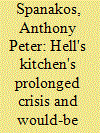

|
|
|
|
|
| Publication |
2014.
|
| Summary/Abstract |
Comic book heroes often have their origins in noir depictions of failed or failing states. The danger involved and the seeming anarchy that necessitates superheroes recall Hobbes's description of a state of nature and Leviathan as resolution. But comic book heroes generally inhabit states that are better identified by the Hobbes-inspired Carl Schmitt. Indeed, this articles argues that while the Hell's Kitchen of Daredevil comics has some characteristics of a state of nature, it is better characterized by the protracted crisis of state that Schmitt sees in liberal democracies. Hobbes and Schmitt elucidate the crisis that generates the need for a superhero but fail to explain why the superhero does not simply take over the city. This is better explained by American concepts of heroism which emphasize redemption and walking away from power (Lawrence and Jewett 2002).
|
|
|
|
|
|
|
|
|
|
|
|
|
|
|
|
| 9 |
ID:
105180
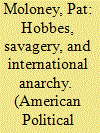

|
|
|
|
|
| Publication |
2011.
|
| Summary/Abstract |
This article argues that Hobbes constructed the sovereignty acknowledged among European states on the supposition of the absence of sovereignty in the New World. The notion of international anarchy found in Hobbes before the twentieth century was not the anarchy of interstate relations later posited by realism, but the anarchy of prepolitical societies outside the ordered system of European states. The modern geography of sovereignty that Hobbes established is demonstrated with reference to the cartographic traditions that informed his representation of the state of nature and the civil state, and to the historical context of the law of nations as it was understood to manage colonial rivalry in the seventeenth century. By constructing savages as absolutely free individuals in the state of nature, he precluded their recognition as free sovereign states. He thus contributed a set of premises to natural jurisprudence that denied indigenous societies statehood and excluded them from the family nations. A sketch of the Hobbesian legacy among theorists of the law of nations and international law is made, showing how his motif of savage anarchy remained central to our conceptualization of the sovereign state within the international realm into the twentieth century.
|
|
|
|
|
|
|
|
|
|
|
|
|
|
|
|
| 10 |
ID:
149186
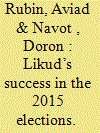

|
|
|
|
|
| Summary/Abstract |
The current article develops an explanation for Likud’s success, which goes beyond the existing structural and circumstantial accounts. It argues that Likud’s success should be sought for in the utilization of Hobbesian logic by its leader, Benjamin Netanyahu. By revealing the commonalities between Hobbes’s political thinking and Rhetoric, and Netanyahu’s political conduct, this paper sheds new light on Netanyahu’s leadership and sources of legitimation and authority in Israel, which are understudied. We demonstrate that Netanyahu’s Hobbesian dimension is best reflected in his understanding of the nature of civil and political rights in the context of an ongoing struggle for survival and self-determination.
|
|
|
|
|
|
|
|
|
|
|
|
|
|
|
|
| 11 |
ID:
102773
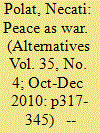

|
|
|
| 12 |
ID:
110832
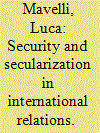

|
|
|
|
|
| Publication |
2012.
|
| Summary/Abstract |
What is the relationship between security and secularization in International Relations? The widespread acceptance of secularism as the paradigmatic framework that underlies the study of world politics has left this question largely unexplored. Yet, the recent challenges to the secularization thesis and the growing attention that is being devoted to questions of religion and secularism in international politics increasingly suggest the importance of undertaking this investigation. This article takes up this task in three main steps. First, it will explore how the limits of a widely accepted but nonetheless problematic account of the emergence of the modern Westphalian nation-state contribute to a dominant underlying assumption in security studies that implicitly associates security with secularization. Second, it will articulate a competing genealogy of security and secularization which suggests that rather than solving the problem of religious insecurity, secularization makes the question of fear and the politics of exceptionalism central to the state-centric project of modernity and its related vision of security. Finally, the article will examine how these elements inform and, most of all, constrain attempts to move beyond the traditional state-centric framework of security. The focus will be on three such attempts: human security, the securitization theory and Ken Booth's critical theory of security.
|
|
|
|
|
|
|
|
|
|
|
|
|
|
|
|
| 13 |
ID:
177563
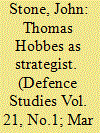

|
|
|
|
|
| Summary/Abstract |
Hobbes’ relevance to the concerns of strategy has gone unappreciated. He is, after all, interested in escaping the condition of war, rather than exploiting its political utility. And yet, exactly because of this, Leviathan addresses the principal difficulty with strategic deliberation – which is the epistemic deficit that attends human interaction, encouraging anticipatory violence. As the military theorist Carl von Clausewitz observed, minimizing the costs of war involves identifying opportunities for exercising mutual restraint over its conduct. And achieving this requires that the aforementioned epistemic deficit be ameliorated. For Hobbes, the sovereign state achieves this for its citizens; but he also considers other solutions in the context of relations between such states. The resulting insights are relevant to matters such as nuclear deterrence, and recent stability operations in the Middle East.
|
|
|
|
|
|
|
|
|
|
|
|
|
|
|
|
|
|
|
|
|